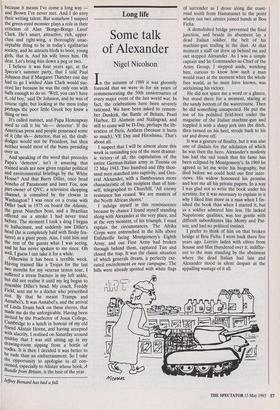Long life
Some talk of Alexander
Nigel Nicolson
In the autumn of 1989 it was gloomily foretold that we were in for six years of commemorating the 50th anniversaries of every major event of the last world war. In fact, the celebrations have been severely rationed. We have been asked to remem- ber Dunkirk, the Battle of Britain, Pearl Harbor, El Alamein and Stalingrad, and still to come will be D-Day, perhaps the lib- eration of Paris, Arnhem (because it hurts so much), VE Day and Hiroshima. That's about all.
I suspect that I will be almost alone this week in reminding you of the most dramat- ic victory • of all, the capitulation of the entire German-Italian army in Tunisia on 12 May 1943. Two hundred and fifty thou- sand men marched into captivity, and Gen- eral Alexander, with a flamboyance more characteristic of the recipient than of him- self, telegraphed to Churchill, 'All enemy resistance has ceased. We are masters of the North African shores.'
I indulge myself in this reminiscence because by chance I found myself standing along with Alexander at the very place, and at the very moment, of his triumph. I must explain the circumstances. The Afrika Corps were entrenched in the hills above Enfidaville facing Montgomery's Eighth Army, and our First Army had broken through behind them, captured Tun and closed the trap. It was the classic situation of which generals dream, a perfectly exe- cuted encirclement en rase campagne. The hills were already spotted with white flags of surrender as I drove along the coast- road south from Hammamet to the point where our two armies joined hands at Bou Ficha.
A demolished bridge prevented the final junction, and beside its abutment lay a dead Italian soldier, the belt of his machine-gun trailing in the dust. At that moment a staff car drew up behind me and out stepped Alexander. As I was a simple captain and he Commander-in-Chief of the Army Group, I stepped aside, watching him, curious to know how such a man would react at the moment when the whole free world, as he must have known, was acclaiming his victory.
He did not spare me a word or a glance, but stood there for a moment, staring at the sandy bottom of the watercourse. Then he did something unexpected. He put the toe of his polished field-boot under the magazine of the Italian machine-gun and toppled it with a sharp jerk into the ditch, then turned on his heel, strode back to his car and drove off.
It was a gesture of finality, but it was also one of disdain for the adulation of which he was then the hero. Alexander's modesty has had the sad result that his fame has been eclipsed by Montgomery's. In 1969 he agreed to let me write his biography, but died before we could hold our first inter- views. His widow honoured his promise and lent me all his private papers. In a way I was glad not to write the book under his scrutiny, for it was necessary to explain in it why I liked him more as a man when I fin- ished the book than when I started it, but as a soldier admired him less. He lacked Napoleonic qualities, was too gentle with difficult subordinates like Monty and Pat- ton, and had no political instinct.
I prefer to think of him on that broken bridge at Bou Ficha. I went back there five years ago. Lorries laden with olives from Sousse and Sfax thundered over it, indiffer- ent to the man standing by the abutment where the dead Italian had lain and Alexander stood in silent despair at the appalling wastage of it all.


































































 Previous page
Previous page